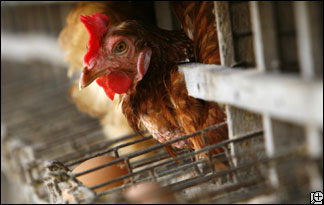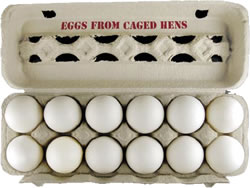BROKEN MOVEMENT
OpEds—
BROKEN MOVEMENT
By ED DUVIN, Editor at Large
The founder of this publication, Patrice Greanville, and I made our way to the beginnings of the “activist” animal rights movement in the 1970s, believing it was an overlooked bastion of exploitation. Ignoring the intrinsic interests of our nonhuman family makes a mockery of social justice, as justice is indivisible. We eventually returned to our broader quest for an egalitarian ethos, but our hearts remained with the plight of oppressed beings. As we turned our attention to other moral imperatives, we weren’t about to leave our animal friends behind.
 |
 |
I penned an essay in 2008 for Cyrano’s Journal Today, addressing the ever-growing dominance of the Humane Society of the U.S. (HSUS). A new leadership team assumed the reins at HSUS, believing the cause suffered from a surfeit of diffusion. Their vision for remediation was not without merit: acquiring sufficient clout through mergers and other means to match power with power, dealing with our formidable adversaries from a position of strength. They increasingly became the prevailing force in the movement, and as I wrote in 2008, “It is difficult to hear other voices when one organization owns the preponderance of microphones.”
HSUS’ tactical expertise is principally legislative, an area in which they set the standard for proficiency. For that and other achievements, we owe them a profound debt of gratitude. Questions remain, however, vis-à-vis the strategic soundness of their moral compass. This inexorably leads to the old incremental vs. abolitionist debate, which is hardly the crucial issue. Indeed, all social change is incremental. The salient question is whether a given step sets the stage for the next advancement toward ending speciesism, or does it in fact impede future progress by institutionalizing cruelty? In the Battery Cage Agreement with the United Egg Producers (UEP), it is axiomatic to any thoughtful person that HSUS woefully lost its way.
Without enumerating every detail, HSUS negotiated some cage and climatic “enrichments,” along with egg-carton labeling. In return, HSUS agreed to stop undercover investigations, ballot measures, state legislation, and litigation during the 18 year implementation period. HSUS and UEP are now imploring Congress to codify this agreement into law, confining many millions of hens to “enriched” cages in perpetuity, as the UEP has no further mandate or incentive to ever reach a cage-free end point. These hens will never know a day of freedom…not in 18 years, not ever. How in the name of sanity did we get here, literally settling for crumbs baked by the UEP at the expense of any hope for liberating hens from their heinous imprisonment.
Having formerly headed an environmental ethics center affiliated with HSUS and knowing many of the principal parties involved in this agreement, I neither question their good faith nor doubt their negotiating skills in light of UEP’s intractability. It was the best they could achieve, but instead of walking away and relentlessly intensifying pressure on the egg industry, HSUS confused compromise with concessions. No agreement at all would have been infinitely preferable to forever condemning many millions of hens to confinement for life. Are those in healing professions not morally bound by the Hippocratic “do no harm” maxim, and yet HSUS incredulously continues to defend the indefensible.
The 34 board members of the UEP consist of egg farmers, representing the collective voice of the egg-producing industry. Conversely, HSUS, absent the authority to represent any other organization, unilaterally signed on to this agreement as though “father knows best.” Who ordained HSUS as spokesperson for a diverse movement composed of several thousand organizations? What unmitigated hubris, as though might makes right. The French speak of sine qua non, an essential element, and is it not essential if one speaks for the movement that they represent the movement? It would seem so, but apparently not to our friends at HSUS.
The central players in this tragic farce, however, are not HSUS’ leadership, but a broken movement that is largely paralyzed by passivity and myopia. Were it not so, organizations across the country would be looking in the mirror, not simply seeing the aforementioned limitations of HSUS, but also galvanizing a massive effort to defeat the ill-advised legislation—legislation that mortgages our core principles to expediency. HSUS didn’t steal our votes; we freely gave them away by proxy. If we are to criticize HSUS, let us not give ourselves a pass.
We are granting to HSUS that which is not our right to grant: our solemn responsibility to protect those who cannot protect themselves. With a few notable exceptions, our movement’s unconscionable silence speaks to our complicity. We claim to be the voice of the voiceless, but who is speaking for the hens whose freedom and future were negotiated away? Even traditional groups that concur with the Battery Cage Agreement should be offended, as no organization vested HSUS with the power to negotiate on its behalf. As noted above, if HSUS is a “runaway” organization, it reflects a damaged movement as much as HSUS’ manifest lack of humility.
Over two decades ago, I “indicted” the shelter industry for accepting the mass killing of healthy cats and dogs as an acceptable means of “controlling” overpopulation. Compounding matters, a quiescent animal rights movement sat silently on the sidelines while the barrels were filled with precious bodies. Once again, I feel that same shame, not only due to HSUS placing its imprimatur on such an agreement, but the acquiescence of the movement to the blatant usurping of power by a sister organization. Send a message to Congress opposing H.R. 3798 today, before it does irreparable damage to our extended family. If we fail to do so with efficacy and urgency, it will leave an indelible stain on the very fabric of this movement’s conscience.
Some might see these criticisms as unfair, as why would HSUS negotiate such an agreement with endorsements from several organizations? Doubters can form their own opinions by going to HSUS’ website and reading, “An HSUS Report: Welfare Issues with Furnished Cages for Egg-Laying Hens” (if it hasn’t vanished!). (1) The abstract’s conclusion from HSUS’ own report follows: “While allowing for some natural behavior denied in conventional cages, furnished cages remain unable to adequately provide for an acceptable level of welfare for hens kept in commercial egg production.” If an agreement takes 18 years to implement and fails to “provide for an acceptable level of welfare,” is this the future for hens we want Congress to enact into law?
__________________________________________________
A WORD ABOUT THE AUTHOR, BY THE EDITOR
______________
(1) If the document should prove unavailable for any reason, try this location in our own servers, where we store background information.
__________________________________________________